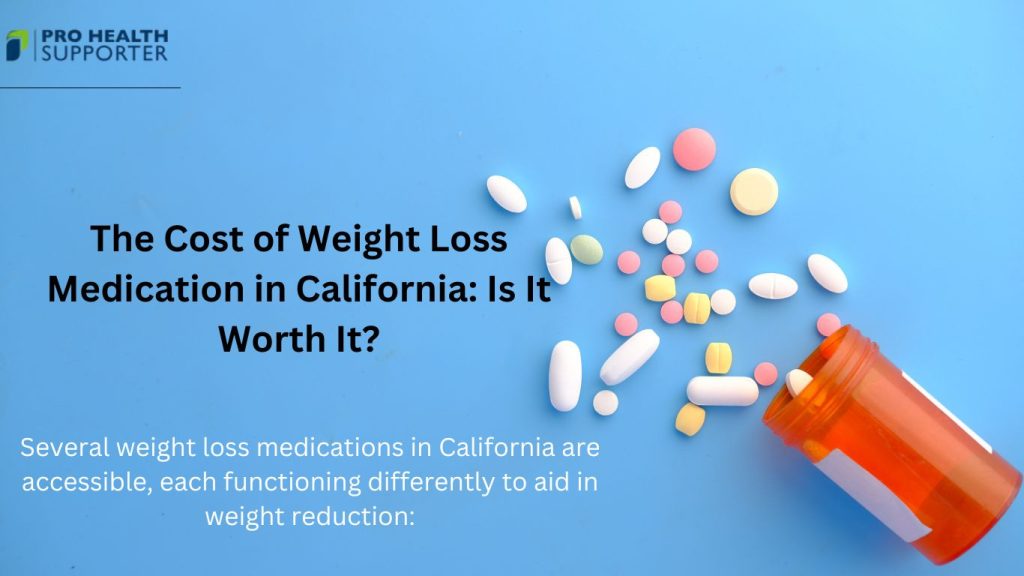Weight loss medications have become an increasingly popular option for individuals seeking to manage obesity, especially in California, where lifestyle and health consciousness are prevalent. These medications, often prescribed alongside diet and exercise, can be effective but come with varying costs and considerations. Understanding the financial implications and evaluating whether these treatments are worth the investment is crucial for potential users.
Types of Weight Loss Medications Available in California
Several weight loss medications in California are accessible, each functioning differently to aid in weight reduction:
- Appetite Suppressants: Medications like phentermine reduce appetite, helping individuals consume fewer calories.
- Fat Absorption Inhibitors: Orlistat works by decreasing the body’s ability to absorb dietary fats.
- GLP-1 Receptor Agonists: Drugs such as Ozempic (semaglutide) mimic hormones that regulate appetite and food intake.
Cost of Weight Loss Medications in California
The cost of these medications varies significantly based on factors like the specific drug, dosage, insurance coverage, and pharmacy pricing. For instance, Ozempic, a GLP-1 receptor agonist, can cost between $800 to $1,200 per month without insurance.
Insurance coverage can substantially reduce out-of-pocket expenses, but coverage varies widely among providers and plans.
Insurance Coverage and Accessibility
Insurance coverage for weight loss medications in California is inconsistent. Some insurers may cover certain medications, while others may not, often due to the classification of these drugs as lifestyle treatments rather than essential therapies. Government health plans, especially Medicaid, play a crucial role in providing coverage for weight-loss drugs like Novo Nordisk’s Wegovy and Eli Lilly’s Zepbound. Medicaid programs give 31.6 million low-income individuals access to these medications, and government-funded health plans, including those for federal and local employees, cover a total of 52.2 million Americans.
It’s essential for individuals to consult with their insurance providers to understand their coverage options.
Evaluating the Worth: Benefits vs. Costs
When considering weight loss medications, it’s important to weigh the potential benefits against the costs:
- Efficacy: Many weight loss medications have shown effectiveness in clinical trials, with some individuals experiencing significant weight reduction. For example, GLP-1 receptor agonists like Ozempic have demonstrated the ability to promote short-term weight loss, with participants losing an average of 12-15% of their body weight over 68 weeks.
- Health Improvements: Weight loss can lead to improvements in obesity-related conditions such as type 2 diabetes, hypertension, and sleep apnea. Notably, Eli Lilly’s obesity drug, Zepbound, has received Medicare coverage for treating sleep apnea, highlighting the recognized health benefits of weight loss medications.
- Side Effects: Potential side effects vary by medication and can include gastrointestinal issues, increased heart rate, or mood changes. It’s crucial to discuss these with a healthcare provider.
- Long-Term Commitment: Some medications may require long-term use to maintain weight loss, potentially leading to ongoing expenses. Discontinuation can result in weight regain, emphasizing the need for sustainable lifestyle changes alongside medication.
Verapamil is a calcium channel blocker primarily used to treat high blood pressure and heart conditions. Its relationship with weight is complex. Some individuals report weight gain due to side effects like constipation and water retention, while others do not experience significant weight changes.
It’s not typically associated with weight loss and should not be considered a weight loss medication.
Making an Informed Decision
Before deciding to use weight loss medications in California, consider the following steps:
- Consult a Healthcare Provider: Discuss your weight loss goals, medical history, and the potential benefits and risks of various medications.
- Review Insurance Coverage: Contact your insurance provider to determine which medications are covered and understand your out-of-pocket costs.
- Consider Lifestyle Changes: Medications are most effective when combined with healthy lifestyle changes, including diet and exercise.
- Evaluate Long-Term Sustainability: Consider whether you can commit to the financial and lifestyle aspects of long-term medication use if necessary.
Conclusion
Weight loss medications can be a valuable tool for individuals struggling with obesity in California. However, the costs can be substantial, and insurance coverage varies. It’s essential to carefully evaluate whether the potential health benefits outweigh the financial investment and to approach weight loss as a comprehensive journey that includes medical, lifestyle, and psychological components. Always consult with healthcare professionals to make the most informed and personalized decision regarding weight loss treatments.
